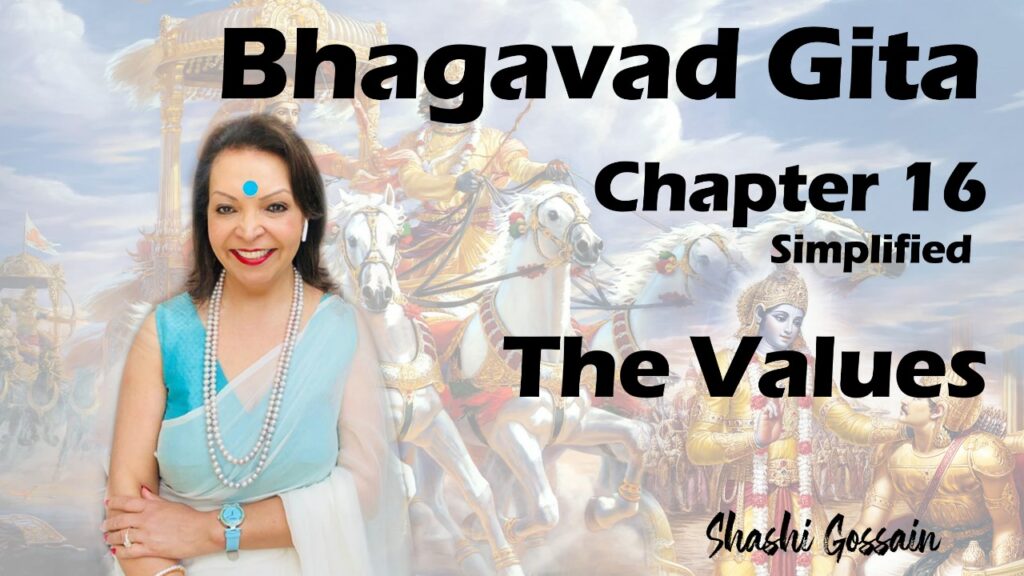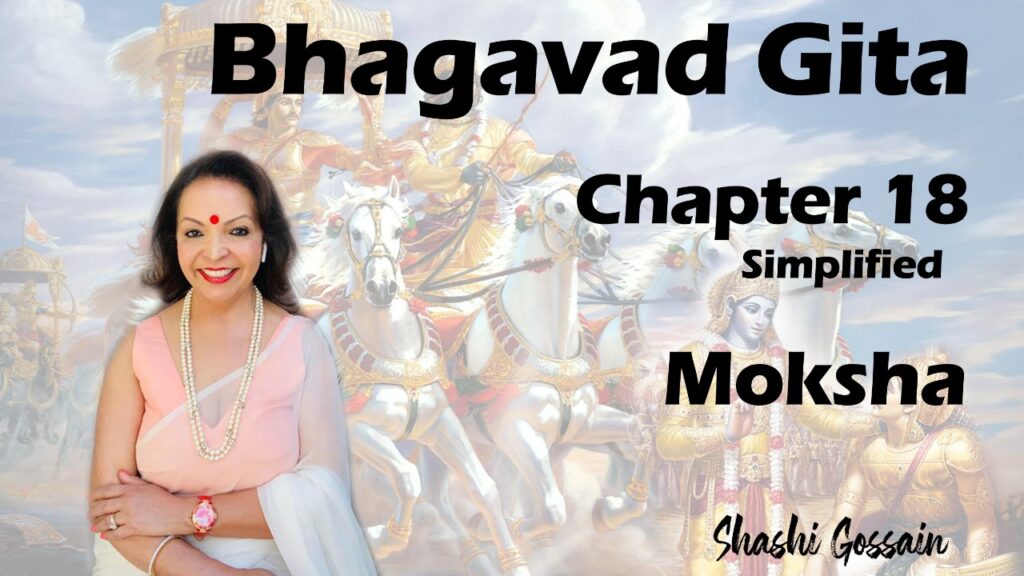Indian literature is full of stories of battles between the devas (angels) and asuras (devils), representing the inner conflict in the human mind between good and evil. In chapter 16 of Shrimad Bhagwat Geeta, Shri Krishna says that there are two classes of people are created according to their gunas- the divine and the devilish. They are endowed with different qualities. Shri Krishna describes the Divine qualities to aspire to and Devilish qualities to avoid. There are two kinds of action, with different results: A person who:
- Discards , guidance from scriptures does not get worldly happiness, nor the supreme destination.
- Live by the rules of the scriptures, will attain the supreme destination through self–realization.
What are the qualities of a person born to a divine fulfillment (Ch 16)? What are the divine qualities?
Shri Krishna first lists 26 Divine qualities:
-
Fearlessness: Once we realize that the universe is a play of Ishvara’s Prakriti, we automatically develop fearlessness. We are fearless of:
- Death, because we have understood that death applies to the body, not to the self.
- Harm caused to our property and our relationships. If we remove the label of mine from everything, and recognize that everything is Ishvara’s, fear automatically goes away.
- Purity of mind: Absence of any thought to hurt or cheat anyone.
-
Steadfastness in the yoga of knowledge:
- True knowledge is knowledge of our own self, the answer to the question “who am I”.
- Yoga refers to any process that connects us to something higher.
So to stay steadfast is to internalise this knowledge & abide by it.
- Charity: Attachment to objects is an obstacle tothe spiritual journey. Charity is a good way to reduce this pride of possessions.
- Self-control: Another obstacle in the spiritual journey is the importance we give to our sense organs. The natural tendency of the sense organs is to demand objects that are pleasant to them, but probably not beneficial to our personality as a whole, e.g.The tongue wants unhealthy foods.
- Yajnya: We should be aware that we owe our daily existence to our parents, teachers, our deities, our environment, our ancestors, our fellow human beings and to nature. The culmination of the spirit of yajnya is the giving up of our sense of I, our identity, to Ishvara.
-
Self-contemplation: Studying of the Gita, the Vedas, or any spiritual text, is an essential quality of the seeker.
- The inspiration should come from within.
- The study should be from a teacher/guru.
- we should perform introspection
- Penance: Refers to the fulfilling of one’s duties, without wasting time and energy at the level of body, mind or intellect. e.g give up watching TV. This releases energy that can be channelled for spiritualism.
-
Straightforwardness: Do not practice deceit or anger towards anyone, and stand by your words & actions.
- Non-violence: Do not harm or injure anyone through action or speech. This will harm our own mind and a hinderance to access Ishvara within.
- Truthfulness: Speaking the truth is considered the highest dharma. But truth should also be communicated kindly & gently.
- Absence of anger: We have to learn how to keep an anger in check, & not to over-react in stressful situations.
-
Renunciation:
- We need to renounce our sense of I, our individuality.
- To give up the notion that our possessions & senses belong to me.
- Tranquillity: This refers to the calming of our mind, body and intellect. Do not get agitated over likes/dislikes through our senses. Without calmness, progress on the spiritual path is not possible.
-
Absence of slander:
- do not find faults in others.
- do not gossip
- do not agitate others.
- Compassion towards all beings We acknowledge the unity of our self, of our “I” with “someone else’s I”. It means that we can put ourselves in someone else’s shoes and see their point of view & understand their suffering & be compassionate.
- Lack of greed: Not to indulge in objects those are harmful to us. e.g. sweets, alcohol
- Gentleness: Treat everyone with gentleness, with no harsh words.
- Modesty: Do not let pride overtake common-sense. Be humble.
- Lack of fickleness: Control all our senses, and stay true to ourselves & others.
- Radiance: When we control our sense organs and stop wasting energy through relentless pursuit of objects, there’s an influx of additional energy that will radiate out of our body.
- Forgiveness: When we learn to forgive someone immediately, we shall get a calmness. The way to do this is to not expect any joy or sorrow from anyone or anything.
- Fortitude: This is the ability to keep holding on to our goal, even when we have situations in our life when our mind, body and senses will reach their breaking point.
-
Purity
- External cleanliness of our body & surroundings.
- Internal purity, keeping our mind and intellect free of likes/dislikes/attachments.
- Lack of enmity: Do not have any hatred or act of revenge towards anyone.
-
Lack of arrogance: Through constant spiritual practice; ego & pride are reduced. Our individuality will emerge with Ishvara.
Shri Krishna concludes the list of divine attributes. Since very few people are born with all these qualities, we have to consciously start cultivating good habits.
Which are demonic qualities?
Shri Krishna then proceeds to list the attributes of demons or Asuras. Although depicted as fearsome devils with long teeth, asura actually means one who places sense objects as his highest goals. Any ordinary looking human being can be an asura, if he constantly dwells in sense pleasures.
- Hypocrisy: Portray them to be smarter, wiser and accomplished than they really are.
- Arrogance: Ego & selfishness towards less fortunate.
- Conceit: Pride over possessions, and insult others who may not have what we have.
- Anger: Physical or mental torment will destabilise the mind.
- Harshness: Physical violence or insulting language is harshness in action or speech
-
Ignorance: Chasing momentary pleasures in the material world without regards to actions and consequences. This is the ignorance of our true nature.
Shri Krishna says that we can increase the chances of our success in the spiritual path if we cultivate the divine qualities & reduce our devilish qualities.
Is anger bad or good?
In today’s day and age, we may think it’s impossible to get ahead in life without these negative qualities, but it is not so.E.g. Anger. Whenever we are angry:
- Our intellect, our power of reasoning shuts down.
- Our emotional mind takes over &
- We perform actions that may harm us in the long run.
We have to use the divine quality of keeping our anger in check. Shri Krishna assures Arjun, that he is endowed with divine qualities, which will most lead him towards liberation. Shri Krishna asserts two types of beings have been created:
- The divine, which has already been described &
- The devilish, which is described next.
What is meant by materialism? What is a materialistic person?
Today, we are always struggling between:
- spiritual journey: the ideal principle &
- materialism: the modern way of life
Shri Krishna now describes the materialistic world. - how they think and feel
- their attitude towards people and objects &
- the consequences of their materialistic viewpoint.
Shri Krishna points out the poor values in the purely materialistic world. He says these people: - do not know the right or wrongful actions
- unclear about the pros and cons of everything
- do not have purity
- lead haphazard and messy lives
- lack good manners, humility, courtesy and politeness.
- if they do not get the result they want, they will get their results by lying, cheating & deceit
They focus only on Wealth or Desire. They forget that there are two other goals in life, dharma or duty and moksha or liberation. They will not place a lot of importance on satyam, truth, doing things the right way. The materialistic people view everything as comprised of atoms and molecules. So then, - I am nothing but a combination of these elements, and
- The world is also nothing but a combination of these elements.
Both are caused by the union of elements, either through chemical or biological reactions that happen due to forces of attraction, forces of desire. Now, if the world is comprised of nothing but inert matter, one will concluded that there is nothing higher to it. If the world is an inert, unreal entity, why should I treat it with care? Anything, including lying, cheating and murder, is then justified. Materialists go one step further and assert that there is no governing principle in this world, no God. So I can get away with whatever I want, because there is no universal law. E.g. a terrorist There was one moment in their life where they realized that using physical force on another person gave them power and joy, without consequences of their actions. They have no sense of connectedness, nothing in common with anyone else. They are lost souls. They have no concept that there is something beyond the physical body, whether it is soul or humanity. A major aspect of the materialistic world view is greed, meaning selfish desires that can never be satisfied or fulfilled. They become pretentious. As they accumulate more wealth and power, they feed their superiority complex, resulting in excessive pride. He says that these materialistic individuals do not have even a single moment of peace. Their mind is always agitated with an infinite number of anxieties and worries. This constant state of tension is there till the end of their life. Having desires is normal. But when we give too much importance to desire, our mind is in a constant state of agitation until each desire is fulfilled. And even if we have all the wealth and power in the world, there will always be something that we are missing, which will in turn generate anxiety. We develop attachment & get bound towards the desires, like the tightening of a rope. Hundreds of desires, hundreds of ropes. If a desire does not get fulfilled, it generates anger and agitation, causing them to inflict harm and pain upon themselves and upon others. They fall into a vicious cycle of desire, anger and greed. Shri Krishna wants us to examine our own level of materialism in it. - our ultimate goal
- our destination
- our objective in life.
Most of us will come to a similar conclusion that is: accumulation of wealth so that we can take care of our material desires as well as those of our family. But desires can multiply infinitely. If any of those desires is unfulfilled, we invite stress, tension and anxiety into our lives. We need to be able to manage our desires, before they get out of hand. Materialistic people try to project their power and arrogance wherever possible. e.g. - They have accomplished everything there is to accomplish.
- There is no one mightier than them.
They mistake this sense of power for happiness, because they have not experienced what real happiness is.
What does it mean to have false pride?
Shri Krishna then describes the mindset of people who derive pride from wealth, they boast about their latest expensive toy, their net worth, etc. They are only interested in consumption and enjoyment. Some people are proud about their family, ancestry and lineage. E.g. royalty or landowners or profession. Some boast about the
- number of sacrifices they have conducted and
- amount of charity they have donated
- this is done for self-publicity, without following the simple Vedic rituals.
To summarise they think:
- No one is equal to me
- I am superior to everyone else
Here:
- Ego is hardened
- Steps away from self-realisation
- Attachments to material objects will keep growing.
Shri Krishna summarizes the lifecycle of a person with devilish tendencies, which is similar to that of a drug addict. The person has an underlying sense of incompleteness or sorrow. By fulfilling a selfish desire, gives him a temporary burst of joy. He wants to repeat this sensation, he wants more of it, and thus becomes addicted to desires and enjoyments. The more he does so, the more power he gives to his emotional mind, and takes power away from his reasoning and intellect. He is trapped in the web of delusion. All he can think about now is
- more and more desires to fulfil, and
- the means to fulfil them.
This is a life of addiction, with no higher aim, spiralling downwards into hell & fire. A person, who is trapped in being overly materialistic, is always trying to be better than his rivals with regards to wealth, power and achievements. This person will only do charity or social service for publicity. Again, the root of all this is the intoxication of wealth and fame. Shri Krishna highlighting more devilish qualities:
- Egotism– Over-inflated importance of one’s self.
- Ignorance– In the Mahabhaarata, ignorance is symbolically represented by the blind king Dhritarashtra, and egotism by his first child Duryodhana, the cause of the Mahabhaarata war. When egoism is strong, one tends to:
- Impose one’s will on others.
- Disregard one’s duties, rules and norms.
- Lose all sense of right and wrong.
Their primary aim of life is selfish desire, resulting in anger when these desires are not fulfilled. Other tendencies such as hypocrisy, pride and conceit are also present. Shri Krishna goes on to say that such people hate Ishvara, who dwells in everyone, including in them, because Ishvara is the voice of conscience that pleads to them to not fall prey to these qualities. In People with devilish attributes, the senses rule over the logic and intellect. Only sensual consumption takes precedence. Shri Krishna says, through the Law of Karma, these cruel, devilish people who torment others, are reborn into devilish wombs such as those of animals and insects. Plants, animals and birds can only follow their instincts and their sense organs. They cannot use the intellect to gain self-realization and liberation. This is the worst punishment possible. Being born as a human is the highest honour because only a human has the ability to shape his or her destiny and humans have a chance to achieve self-realization and liberation. But people, who destroy or kill others, give up this golden opportunity. Such people enter a never ending descent into lower and lower realms of existence. If we also start ignoring our intellect and empowering our sense organs, then there will be no difference between us and animals.
What did Krishna teach?
Shri Krishna summarizes the lengthy list of devilish qualities into three main ones, “the gateways into hell”, because they lead to the path of destruction rather than the path of liberation. They are desire, anger and greed.
- Desire can be controlled through logic & meditation. You can question yourself of why you desire a particular object?
- Anger arises due to unfulfilled desire.
- We require tremendous control over our mind in order to release ourselves from the grip of anger.
- It is therefore better to focus on rooting out unnecessary desires than to confront anger directly.
- Greed can be kept in check through charity. Anytime we start feeling pride over our wealth, we should immediately donate a portion of our wealth or possessions.
Shri Krishna urges us to slowly reduce our devilish qualities of desire, anger and greed. We can then start walking on the path of the divine qualities. Only then do we can attain the supreme goal of self-realization, of oneness with Ishvara, instead of entrapment in the never ending cycle of birth and death. Shri Krishna says that if we live our lives based solely on our desires, we will neither attain success in any worldly endeavour, nor will we attain worldly happiness. The Gita is a practical guide to the teachings in the Vedas. The study of the original Vedas will point us to the right direction for our actions. “Svadharma” is an example that is given in the Vedas. It means, following a career path that is in line with our interests and our qualifications; and then dedicates your life to it. A case in point is Arjuna’s fundamental question: is it right to harm another individual? A soldier of the army defending his country is doing his svadharma, his duty. But a gangster shooting at a crowd are although performing the same action – killing people, is doing out of greed. So, Shri Krishna ends this chapter with an extremely practical message. He gives us a simple formula that will give us peace and happiness in this world, and also put us on the path to liberation. All we need to do is to avoid the three gates of hell which are desire, anger and greed. We do so by making the teachings in the Gita & Vedas are guides for rightful actions to reduce selfish desire.
Indian literature is full of stories of battles between the devas (angels) and asuras (devils), representing the inner conflict in the human mind between good and evil. In chapter 16 of Shrimad Bhagwat Geeta, Shri Krishna says that there are two classes of people are created according to their gunas- the divine and the devilish. They are endowed with different qualities. Shri Krishna describes the Divine qualities to aspire to and Devilish qualities to avoid. There are two kinds of action, with different results: A person who:
- Discards , guidance from scriptures does not get worldly happiness, nor the supreme destination.
- Live by the rules of the scriptures, will attain the supreme destination through self–realization.



